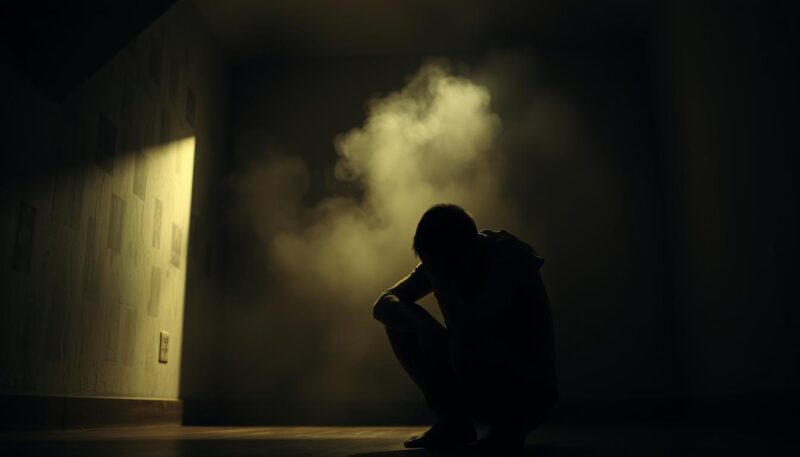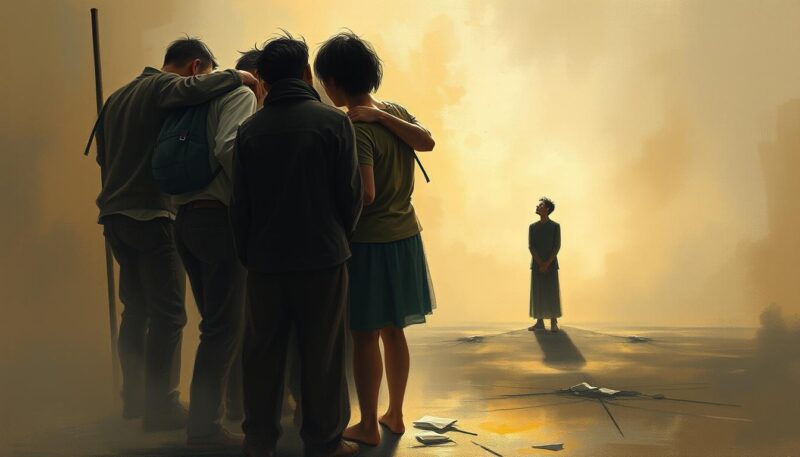One in every 18 people who survive a traumatic event will later be diagnosed with PTSD. But the emotional toll goes deeper. 60% of survivors of the 1987 MS Herald of Free Enterprise capsizing felt survivor’s guilt. This feeling has haunted people from Holocaust survivors to those who have seen modern-day disasters, leaving deep psychological scars.
Survivor’s remorse is about feeling guilty for surviving when others didn’t. It’s different from regular grief because it involves blaming oneself for things beyond control. Psychiatrist William G. Niederland first described it in Holocaust survivors. It has since been recognized in trauma survivors of wars, accidents, and workplace tragedies.
The debate between survivor’s guilt and remorse helps clarify the terms. Remorse is about feeling regret, while guilt is about feeling responsible. Cancer survivors and medical professionals often feel this way, showing it affects many across different generations and situations.
The DSM-5 now sees survivor’s guilt as a symptom of PTSD. This is shown in cases like Sydney Aiello’s suicide after the Parkland shooting and Stephen Whittle’s 22-year battle after Hillsborough. These stories highlight how survivor syndrome, coined by Eddy de Wind, affects many. Up to 64% of lung cancer survivors and 90% of disaster survivors who lost friends feel this way.
Key Takeaways
- 5.6% of trauma survivors develop PTSD, often tied to survivor’s guilt.
- Survivor’s remorse meaning involves self-blame even when no fault exists.
- 90% of disaster survivors report guilt when others die, per 2018 studies.
- DSM-5 classifies survivor’s guilt as a PTSD symptom, not a standalone disorder.
- Cognitive behavioral therapy effectively treats guilt-related anxiety and suicidal thoughts.
Understanding Survivor’s Remorse Meaning and Origin
Survivor’s remorse and survivor syndrome share some similarities but have key differences. This part will look into their roots and how they differ from other conditions.
Definition of Survivor’s Remorse
Survivor’s remorse is a deep sadness felt by those who survive traumatic events. It’s not just a short-term feeling of sadness. It’s a lasting sense of guilt and self-blame, like feeling you don’t deserve to have survived.
Historical Context and Recognition
Dr. William G. Niederland first identified these feelings in Holocaust survivors in the 1960s. His research showed common symptoms like intrusive thoughts and self-doubt. By the 1980s, survivor syndrome was recognized in emergency workers and therapists too.
They sometimes feel like they’ve failed because they’ve heard so much about others’ trauma.
A UK study noted that 90% of survivors of traumatic events reported psychological burden linked to survivor’s guilt.
Survivor’s Guilt vs Remorse
Many confuse survivor’s guilt and remorse. Guilt usually comes from specific actions, like “I should’ve acted faster.” Remorse, on the other hand, is about questioning why you survived at all.
Both feelings can exist together but come from different places. The DSM-III once listed survivor’s guilt as a PTSD symptom. Now, it’s seen as part of a broader trauma response.
- Survivor’s guilt may arise from perceived mistakes during an event
- Survivor’s remorse often involves questioning life’s fairness post-trauma
Knowing the difference helps in offering the right support. For example, cognitive-behavioral therapy can help with irrational guilt. Group therapy is better for dealing with existential remorse.
Common Triggers and Causes
Survivor’s remorse often comes after big life events where others didn’t make it. It can happen after natural disasters, combat, or serious medical issues. For instance, a UK study found 90% of trauma survivors felt deep guilt.
- Natural disasters (e.g., hurricanes, earthquakes)
- Combat exposure (e.g., military veterans)
- Medical diagnoses where others succumbed
- Workplace accidents or mass shootings
- Pandemics like the 2020s global health crisis
| Study | Population | Key Finding |
|---|---|---|
| Murray (2018) | UK trauma clinic clients | 90% of survivors reported severe guilt |
| Hendin & Haas (1991) | Vietnam veterans | 46% linked guilt to suicide risk |
| Joseph et al. (1993) | Maritime disaster survivors | 61% still felt guilt 30 months later |
| Okulate & Jones (2006) | Nigerian soldiers | 38.5% experienced survivor guilt |
“Survivors often blame themselves for surviving when others did not,” noted trauma researcher Dr. Sarah Murray in her 2018 UK study. “This self-blame fuels PTSD and survivor’s remorse.”

Things like mental health issues, past trauma, or feeling alone can increase the risk. Believing survival was unfair can make guilt worse. Research shows 55% of cancer survivors and 31% of oil platform disaster survivors still feel guilty years later. Therapy, like CBT, can help change these negative thoughts.
The Psychological Impact of Survivor’s Remorse
Survivor’s remorse psychology shows how trauma affects our emotions, thoughts, and body. People often feel guilty for surviving, ashamed for living when others didn’t, and angry at their situation. Research found that 46% of Vietnam veterans and 55% of lung cancer survivors felt this way.
These feelings can get worse around the anniversary of the event.
Emotional Manifestations
- Intense guilt about survival decisions
- Feelings of unworthiness or self-blame
- Mood swings and persistent sadness
Cognitive Effects
Survivor’s remorse psychology is filled with negative thoughts like “I should have done more.” People often can’t stop thinking about the event and what they could have done differently. This pattern is similar to PTSD and survivor’s remorse, and it can get worse over time.
Physical Symptoms
- Sleep disturbances and chronic fatigue
- Headaches and gastrointestinal issues
- Heightened stress responses
Long-term Consequences
If survivor’s remorse is not treated, it can lead to serious health problems. Studies show that survivor’s guilt is linked to severe PTSD, with 90% of trauma clinic patients feeling guilty. This guilt can increase the risk of suicide, with over 49,000 U.S. deaths in 2022.
Survivors are 60 times more likely to struggle with guilt after losing others. Research also found that the brain of those with PTSD and survivor’s remorse shows changes in emotional processing.
Survivor guilt was linked to post-service suicide attempts in military veterans (Hendin & Haas, 1991).
Cognitive Behavioral Therapy (CBT) can help change negative thinking patterns. But, many cases are still not recognized. It’s important to understand these effects to provide the right mental health support and prevent long-term harm.
Different Types of Survivor’s Remorse Experiences
Survivor’s remorse comes in many forms, depending on the event that triggers it. This section looks at three main types of survivor’s remorse. Each is linked to different traumas. Understanding these helps us tackle the unique survivor’s remorse symptoms for each situation.

“Guilt about staying alive, failing to act, or survival actions defines post-disaster experiences.”
Psychologist Stephen Joseph studied survivors of a ferry disaster. He found that 60% of them felt guilty. This aligns with trauma-related survivor’s remorse seen in both military and civilian survivors.
| Type | Context | Symptoms |
|---|---|---|
| Post-Disaster | Earthquakes, accidents | Flashbacks, self-blame, nightmares |
| Combat | Military operations | Aggression, isolation, suicidal thoughts |
| Personal Success | Academic/financial achievements | Self-doubt, social withdrawal |
Post-Disaster Survivor’s Remorse
Survivors of natural disasters like Hurricane Katrina and the 2004 tsunami often feel guilty. They might experience survivor’s remorse symptoms such as being always on guard or feeling numb. Joseph’s work shows how random survival in disasters leads to ongoing self-doubt.
Combat-Related Survivor’s Remorse
Military personnel deal with trauma-related survivor’s remorse from battlefield choices. They might feel guilty about surviving when comrades did not. This can lead to sleep problems and feeling disconnected. Programs like FMF FOCUS help through peer support.
Personal Success-Related Remorse
Achieving success when others face challenges can also cause guilt. For example, first-generation graduates or cancer survivors might doubt their worth. This guilt often leads to anxiety and feeling isolated, showing how societal expectations affect our minds.
Coping Strategies and Treatment Options
Many people with survivor’s remorse find help from professionals. Survivor’s remorse treatment often includes therapy, self-care, and support from others. Getting help early can prevent long-term mental health issues, especially for those with ongoing guilt or trauma.
Therapies like Cognitive Behavioral Therapy (CBT) and Eye Movement Desensitization and Reprocessing (EMDR) help change negative guilt patterns. Studies show CBT works for 60–80% of people. Narrative therapy helps people see their experiences in a new light, reducing self-blame. Medications can also help with anxiety or depression caused by trauma.
- Practice mindfulness or yoga to reduce stress (50% see improvement).
- Engage in community service to build purpose, lowering anxiety and depression.
- Join support groups to connect with others who understand the struggle.
Coping with survivor’s remorse also means being kind to yourself. Getting enough sleep, eating well, and exercising can boost your emotional strength. These steps, along with therapy, can help you heal. Remember, asking for help is a sign of strength, not weakness. Most survivors get better with the right treatment.
Conclusion
Survivor’s remorse is a feeling of guilt for surviving while others did not. It has been known since the 1960s. People often feel guilty and blame themselves, thinking they could have changed things.
It’s common, but if it lasts, you might need help. This could be to avoid lasting mental health issues like anxiety or depression.
Coping with survivor’s remorse means accepting your feelings without shame. Therapies like cognitive-behavioral help change negative thoughts. Turning guilt into action, like helping others, is also a way to heal.
Studies show that nearly half of those who practice gratitude see less PTSD symptoms. And 30% grow positively from their experiences. This shows that healing is possible with effort.
Getting help from professionals is important if you feel too much guilt or can’t move forward. Strategies like psychological first aid and support groups can help. Remember, being kind to yourself and seeking help is crucial for healing.
Healing takes time, but there are resources to help you. With the right support, you can find stability and a new purpose in life.
FAQ
What is survivor’s remorse?
Survivor’s remorse is a heavy feeling people get when they survive a traumatic event but others don’t. It makes them feel unworthy, ashamed, and guilty for being alive when others suffered or died.
How does survivor’s remorse differ from survivor’s guilt?
Survivor’s remorse and guilt are similar but not the same. Remorse makes you feel more responsible for surviving. Guilt is about feeling bad for being alive. Remorse is more about what you did or didn’t do during the event.
What are common triggers for survivor’s remorse?
Survivor’s remorse can be triggered by big disasters, war, personal tragedies, or serious illnesses. Being close to victims or having a relationship with them can make these feelings worse.
What psychological symptoms are associated with survivor’s remorse?
Survivor’s remorse can make you feel ashamed, angry, sad, and unworthy. You might also blame yourself or keep thinking about the event. Physical symptoms like not sleeping well or feeling tired are common too.
How can someone seek help for survivor’s remorse?
If survivor’s remorse lasts a long time, getting help is a good idea. Therapies like Cognitive Behavioral Therapy (CBT) and Eye Movement Desensitization and Reprocessing (EMDR) can help. Changing your lifestyle and getting support from friends and family also helps.
Is it normal to feel survivor’s remorse?
Yes, feeling survivor’s remorse is a normal reaction to surviving a traumatic event. It’s hard, but it’s a common feeling. With the right support and strategies, you can cope with it.
Can cultural or social factors influence survivor’s remorse?
Yes, they can. Culture, religion, and society can shape how you feel survivor’s remorse. Different beliefs can change how you experience and express these feelings.
What long-term consequences can result from untreated survivor’s remorse?
Untreated survivor’s remorse can lead to serious problems like depression, anxiety, and addiction. It can also change how you see yourself and your place in the world, affecting your happiness and relationships.
Are there specific types of survivor’s remorse experiences?
Yes, survivor’s remorse can happen in different situations. It can occur after a disaster, in war, or when you feel guilty about succeeding when others didn’t. Each situation has its own challenges but shares common feelings of remorse.
How can mindfulness and meditation help with survivor’s remorse?
Mindfulness and meditation can help manage survivor’s remorse. They help you control your emotions, stop negative thoughts, and understand yourself better. These practices can offer quick relief and support your recovery over time.

